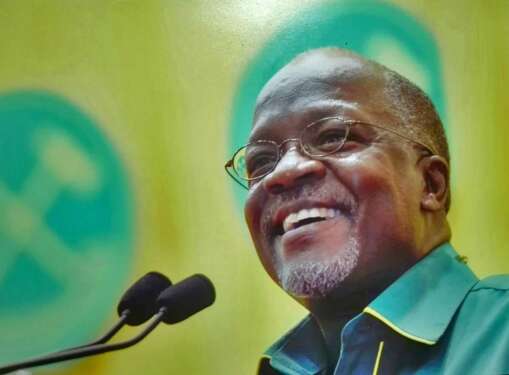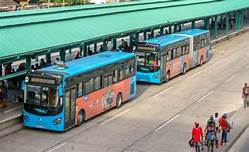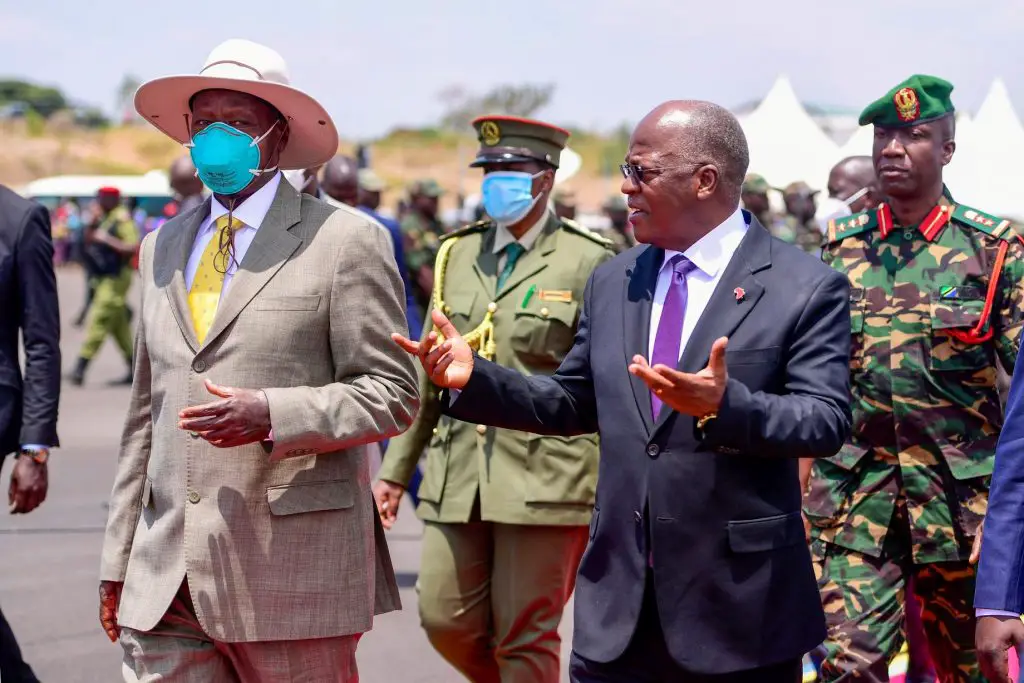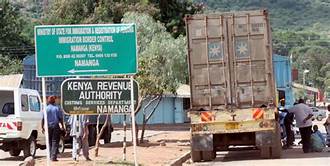- Africa’s new dawn: the rising role of digital and AI in agriculture
- Can Dangote Refinery Transform Africa Energy Ambition
- Gallup Survey: 80 per cent of Kenyan Workers Are Disengaged and Seek New Opportunities
- Madagascar Man Freed from 5KG Tumor After 15-Year Struggle
- How women in Africa are perceived and treated
- Sugar consumption in Kenya to Increase to 1.23 Million Tonnes
- Can Somalia and Turkey Oil deal Bring Change in Somaliland
- Remittances to Kenya dropped to $371.6 million in June, marking a six month low
Browsing: Magufuli
The late Magufuli is celebrated and mourned across the East African Community which has also joined hands with Tanzania to remember his legacy—which extended from his fight against corruption and the misuse of public resources to his diplomatic relations, forged across the landscape through several regional communities—where on numerous occasions he had declared that ‘we are unified as one’.
Magufuli was a stern advocate of hard work for economic excellence. His voice on this matter was as strong as his willpower. Throughout his unfinished tenure, he had demonstrated how Tanzania can transform its natural wealth and utilize domestic tax collections to fuel development projects. …
Tanzania’s President John Magufuli has ordered the country’s Ministry of Minerals to allocate land to iron and other metal smelters; and to lure investors quickly, the president said the land allocation may even be done at ‘no direct charge’ to the investor.
The President issued the order at a swearing in ceremony for the ministry’s new deputy minister, on Friday 11.12.20. President Magufuli was emphatic over the sector’s potential to contribute to national development. He specifically named a few areas that have already been identified to have ‘millions of tonnes of iron deposits.
“We have so much iron deposit, if the smelters ate willing to melt stolen rails they are willing to smelt iron ores,” he said.
“Give investors areas to mine iron and other metals and minerals,” he went on to say and even pointed out that “…even right here at the capital, we have iron deposits.”
With that, …
BRT Tanzania
With several 100 million dollars in investment, the Dar es Salaam Bus Rapid Transit System (BRT) is an infrastructure that deserves as much awe as any other in the world.
The investment involves some19.3km of roadways traversed by over 100 buses. It has27 bus stations built with such style and elegance they do indeed give the city a facelift so to speak.
More than the aesthetic function, the infrastructure has indeed transformed the port city of Dar Es Salaam from the usual narrow roads dotted with vendors to 6 lanes and pave ways for passengers, it looks good.
The BRT system that was designed by a Brazilian international consulting firm called Logit ferries 1000s of passengers every day and given that its buses run on specialized lanes, they face no traffic and so it takes less time to complete the same routes that regular commuter …
Before the dangers of lead were known, it was a common ingredient in house paint, where it acted as a pigment and increased durability. Though banned for use in paint in the U.S. in 1978, millions of homes, schools, and businesses still have lead based paint on their walls, both inside and out. According to the Environmental Protection Agency, lead paint can be found in:
- 24% of homes built from 1960-1978
- 69% of homes built from 1940-1960
- 87% of homes built before 1940
If the paint is in good condition and has been painted over, it usually doesn’t pose a problem. But if the paint is peeling or has been disturbed by scraping, sanding, or burning, it can pose significant health risks to people and pets, especially young children.
How Financial Exits have fared in Africa’s new normal
The case for Tanzania
Back in 2016, the Tanzania Bureau of Standards’ …
Only days after the French oil pipeline Total finalized talks with Ugandan President H.E. Yoweri Museveni, a state visit was made by the Ugandan leader to neighbouring Tanzania where he inked the deal with his counterpart Tanzania’s President H.E. John Magufuli, to jointly develop the East African Crude Oil Pipeline.
The pipeline will be 1 445 km long making it be Africa’s longest heated oil pipeline and is expected to carry some 230,000 barrels per day. Tanzania is expected to get the lion’s share of the deal since almost 80% of the pipeline will run through the country and is expected to employ more than 18,000 Tanzanians.
Most of the benefits involve the construction period of the pipeline where employment will be created for the Tanzanian youth along with a boost of economic activities all along the pipeline.
Uganda struck oil some 14 years ago back in 2006 but has …
Five years ago in 2015, Tanzania voted in a new president, Dr. John Magufuli. One of his very first moves was to stop the country’s annual Independence Day celebrations and instead the millions that would otherwise go into the traditional parade were directed to infrastructure—the congested New Bagamoyo Road expansion.
That year, to celebrate Independence Day, Tanzania held a national cleanup campaign. The President and his deputy, Vice President Honourable Samia Suluhu led the country in cleaning the environment.
I do not mean they signed some environment pollution documents; the president in person walked out of the State House and collected trash, not in his backyard, no, but all the way down to the filth–piled fish market, several meters from the State House.
If anything, the cleanup was symbolic of what was to come under his presidency. Little …
The Tanzania insurance market is still very much untapped and even as the country achieves middle income status, much of the population is still not insured.
Commercial banks in the country have smelt opportunity in the industry and are now circling in. CRDB Bank, a leading bank in Tanzania, recently announced plans to register its own insurance subsidiary firm.
The bank is currently already a broker and enjoying considerable premium back payments which almost double in the span of just 3 years (2016-2019).
In an interview with local media, CRDB’s Broker General Manager, Mr Arthur Mosha said in that short time, their premium levels is up from 44.2bn/- ($19.088 million) from 25bn/- ($10.81 million).
Not surprising, Tanzania’s insurance market grew by 8.6 percent in gross premiums over the course of the last financial year. As of 2018, Tanzania’s insurance industry had 31 insurance companies, 109 insurance brokers and 635 insurance …
At the onset of the pandemic, the two countries, like all others in the region and elsewhere in the world, Tanzania and Kenya closed their borders, for a while. However it soon dawned on both that closing their borders from each other (and their neighbours) was but a band-aid solution.
The underlying trade logistics are already so entwined that no country could do without the other, short of losing hard-gained economic ground. So, no sooner had they closed their borders than the two countries were forced to reopen them.
That is where the third set of complications surfaced; the first — the onset of the coronavirus — was not through any fault of the countries. The second — the closure of their borders in line with international recommendations — was in response to the first, and the third was the lack of a concerted, joint response.
It is the third …
The President of Tanzania, H.E. John Pombe Magufuli has raised a storm on the social media after questioning some of the tests conducted on Tanzanian patients, which he attributes to either poor workmanship in the National Referral Laboratory or faulty kits.
In a televised speech, the Tanzanian leader narrated how his security agents submitted different samples from domestic and wild animals as well as fruits and even natural oil, all disguised as human samples with queer results of goat, pawpaw and quail all returning positive for Covid-19.
Though this has become an online buzz, this has also raised critical questions on the validity of tests currently being used in Africa, mainly from China. There have been fears of the tests returning an invalid result painting a wrong picture of the pandemic.
African countries have been heavily relying on donated kits with Chinese billionaire Jack Ma sending in over one million …
The falling price of crude oil spells good favour for importers in Africa. The price of crude has been on a steady drop despite attempts by producers to cut output. As a result, many African countries are taking advantage of the situation and stock piling their reserves.
Take for instance the case of East Africa, crude oil represents more than 20 percent of Tanzania’s annual imports. So a drop in price of crude means the country can afford to buy more and reserve for future use. However no official report has been issued as to the government policy on the matter.
The issue that arises here is the matter of crude versus refined oil. Africa, Tanzania included, imports refined oil which is more costly than crude but with falling prices of crude then follows that even the price of refined oil has taken a dive
As such, the country is …












